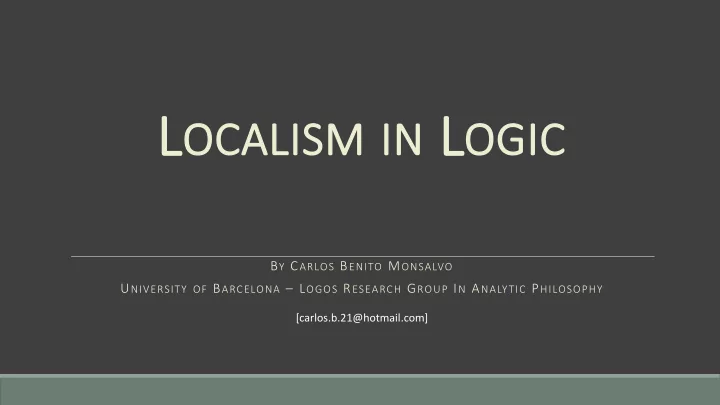

L OCALISM IN IN L OGIC B Y C ARLOS B ENITO M ONSALVO U NIVERSITY OF B ARCELONA – L OGOS R ESEARCH G ROUP I N A NALYTIC P HILOSOPHY [carlos.b.21@hotmail.com]
A IM OF T HE HE P ROJECT IM OF • To introduce a new perspective in the classical debate, within philosophy of logic, of pluralism and monism. Localism / Globalism. • To defend our starting hypothesis in favour of localism. • The problem of mixed domains and collapse theorems • Analysis of different methods for combining logics
S TRUCTURE Monism vs. Pluralism The Globalism / Localism distinction in the debate Criticism Final Remarks
M ONISM VS VS . P LURALISM • Delimit the debate: Priest (2006) / Beall and Restall (B&R) (2000) • Logic is mainly about consequence relations “A conclusion, A , follows from premises, Σ, if and only if any case in which each premise in Σ is true is also a case in which A is true” (B&R, 2000: 476).
G LOBALISM / L OCALISM • Globalism: the implementation of logic is global, in the sense that logical laws and valid arguments must be applicable regardless of the content (the different objects we might reason about). • Localism: there is a multiplicity of types of objects that configure various domains of discourse, in such a way that reasoning about these different kinds of objects requires adopting different logics.
The distinction is orthogonal to that of pluralism/monism. So, this yields, prima facie , four possible theoretical options available in the debate: 1. Globalism – Monism 2. Globalism – Pluralism 3. Localism – Monism 4. Localism – Pluralism
C RITICISM There is a core of valid inferences that every canonically applied logic shares. This is the only logic, since the others would be obtained enthymematically by appealing to the different contingent properties of each sub-domain.
C RITICISM One might defend that there are a variety of domains that require different logics. But there are cases in which one reasons about the interaction of different domains, with premises about different kinds of objects coming from those domains. What kind of logic do we use, then? Mixing logics might result in collapse of connectives.
A method for handling the problem of mixed domains: Chunk and Permeate Chunks : the chunks, C i , in which reasoning is partitioned, are theories consisting of a language, L i , its set of closed formulas, F i , a set of axioms, A i , and a consequence relation, ├ i (Priest, 2014: 333) . Permeability : in order to permeate information between chunks i and j ( i j ), we have a permeability filter ρ ij , which is a subset of F i . Intuitively, ρ ij determines which kind of formulas we will allow to flow from C i to C j . Together with the permeability filter, we need a translation function, t ij : F i → F j , to transform sentences of L i into sentences expressible in L j . = ⟨ { ⟨ L i , A i , ├ i ⟩ : i ∈ I }, { ⟨ ρ ij , t ij ⟩ : i , j ∈ I , i j }, o ⟩
If the process is conducted ω times, then a formula α is a consequence of the 𝜕 (Priest, 2014: 333). ⊩ α , iff α ∈ 𝑈 𝑝 structure,
F INAL R EMARKS • The practice of logic seems to support localism over globalism. New logical systems arise at a stretch. For avoiding or solving a paradox, for formalising reasoning about future contingents, about vague terms, and so on. Against this evidence globalists, like Priest, should provide more and better arguments in order to defend such a strong thesis. • New methods for combining logics are being developed in the last years (chunk and permeate, juxtaposition, algebraic fibring, modulated fibring, and so on). The philosophical implications of these are not clear yet, but we already know that some of them avoid collapses. Therefore, localists do have tools for explaining away the problem of mixed domains.
T HANK Y OU !
R EFERENCES Beall, J. C. and G. Restall . ‘Logical Pluralism.’ Australasian Journal of Philosophy 78 (2000): 475-93. Caleiro, C., Carnielli,W., Rasga, J., & Sernadas , C. ‘ Fibring of logics as a universal construction.’ in Handbook of Philosophical Logic (second edition), Vol. 13. Dordrecht, The Netherlands: Springer, 2005: 123 – 187. Haack, S. Philosophy of Logics . Cambridge: Cambridge University Press, 1978. Priest, G. Doubt Truth to be a Liar . Oxford and New York: Oxford University Press, 2006. —‘Logical Pluralism: Another Application for Chunk and Permeate’ Erkenntnis 79 (2014): 331-38. Schechter, J. ‘Juxtaposition: a New Way to Combine Logics’ The Review of Symbolic Logic 4 (4) (2011): 560-606.
Recommend
More recommend